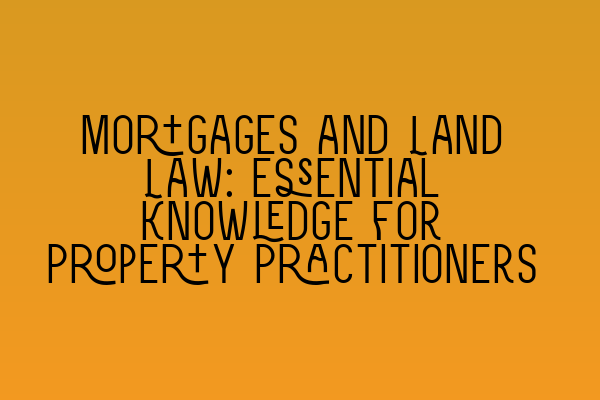<h1>Mortgages and Land Law: Essential Knowledge for Property Practitioners</h1>
<p>Welcome to SQE Property Law & Land Law. As a property practitioner, it is essential to have a deep understanding of mortgages and land law. Mortgages play a crucial role in property transactions, and a comprehensive knowledge of land law is vital to ensure that your clients’ interests are protected. In this blog post, we will explore the key concepts and principles related to mortgages and land law, providing you with the essential knowledge you need to excel in your legal practice.</p>
<h2>Understanding Mortgages</h2>
<p>A mortgage is a legal agreement between a lender (often a bank or a building society) and a borrower (the property owner) that allows the borrower to borrow money to purchase a property. The property itself serves as collateral for the loan, and in the event of default, the lender has the right to take possession of the property and sell it to recover their investment.</p>
<p>When advising clients on mortgages, it is crucial to understand the different types of mortgages available. Some common types include fixed-rate mortgages, variable-rate mortgages, interest-only mortgages, and buy-to-let mortgages. Each type has its own specific features and requirements, and it is essential to assess your clients’ individual circumstances to determine the most suitable mortgage option for them.</p>
<h3>Key Considerations in Mortgages</h3>
<p>When dealing with mortgages, there are several key considerations that property practitioners need to keep in mind. These include:</p>
<ul>
<li>Title and Ownership: Before granting a mortgage, it is crucial to verify the title and ownership of the property. This involves conducting thorough searches and investigations to ensure that your client has valid and marketable title to the property.</li>
<li>Mortgage Documentation: Drafting and reviewing mortgage documentation is a critical aspect of property practice. From the mortgage deed to the terms and conditions, attention to detail is essential to protect your client’s interests.</li>
<li>Registration: Registering the mortgage with the appropriate land registry is a vital step to ensure that the lender’s security interest is protected.</li>
<li>Enforcement: In the unfortunate event of default, understanding the process of mortgage enforcement is crucial. This includes the steps involved in repossession and sale of the property to repay the outstanding debt.</li>
</ul>
<h2>Land Law Principles</h2>
<p>In addition to mortgages, a solid understanding of land law is fundamental to property practice. Land law governs the rights and obligations related to the ownership, possession, and use of land. Some key principles to keep in mind include:</p>
<ul>
<li>Legal Estates: Land can be held in various legal estates, including freehold, leasehold, and commonhold.</li>
<li>Easements and Covenants: Easements and covenants are legal rights and obligations that attach to land. Understanding their nature, creation, and enforcement is crucial when dealing with property transactions.</li>
<li>Land Registration: Registered land and unregistered land have different legal requirements and processes. Familiarize yourself with the rules and procedures governing land registration in your jurisdiction.</li>
<li>Boundaries and Adverse Possession: Disputes over boundaries and adverse possession can be complex. Knowing the relevant case law and legal principles will allow you to effectively advise your clients in such matters.</li>
</ul>
<h3>Continuing Professional Development</h3>
<p>As a property practitioner, it is essential to continuously update your knowledge and skills in mortgages and land law. SQE Property Law & Land Law offers a range of resources and training options to assist you in your professional development. Consider joining our SQE Contract Law webinars to gain expert insights and guidance, and take advantage of our interactive SQE mock tests for contract law to test your knowledge and skills.</p>
<p>Additionally, if you are interested in further enhancing your understanding of contractual capacity, we highly recommend reading our article on <a href=”https://contract-law-sqe.co.uk/understanding-contractual-capacity-rights-and-limitations/”>Understanding Contractual Capacity: Rights and Limitations</a>. This article explores the legal rights and limitations surrounding contractual capacity, an essential concept in property transactions.</p>
<p>Expand your expertise in contract law by exploring our <a href=”https://contract-law-sqe.co.uk/sqe-prep-mastering-the-essentials-of-contract-law/”>SQE Prep: Mastering the Essentials of Contract Law</a> resources. These resources provide comprehensive coverage of contract law principles and concepts, ensuring you have a solid foundation of knowledge.</p>
<h4>Conclusion</h4>
<p>Mortgages and land law are critical areas of knowledge for property practitioners. By understanding the different types of mortgages, the key considerations involved, and the principles of land law, you can provide valuable advice and support to your clients. Stay updated with the latest developments in the field and continue to enhance your knowledge through professional development opportunities. At SQE Property Law & Land Law, we are dedicated to helping you excel in your legal practice.</p>
